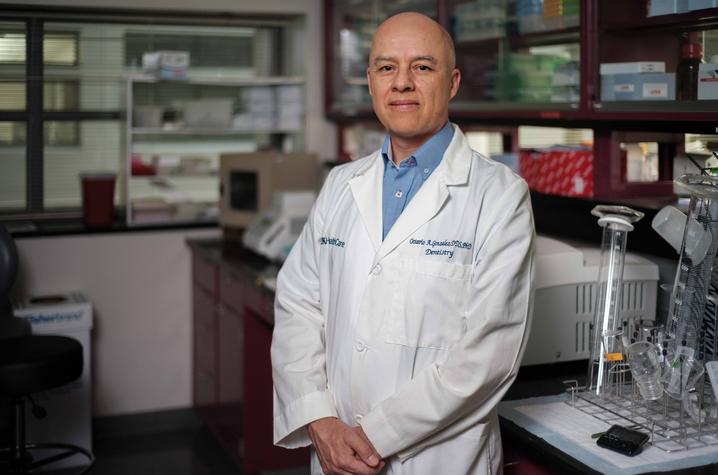Octavio A. Gonzalez: 2024-25 University Research Professor Q&A

Octavio A. Gonzalez, D.D.S., Ph.D., a professor in the Center for Oral Health Research and Division of Periodontology in the UK College of Dentistry with a secondary appointment in the Department of Microbiology, Immunology and Molecular Genetics in the College of Medicine, has been honored as a 2024-25 University Research Professor.
Gonzalez joined UK in 2010. His research focuses on identifying cellular and molecular mechanisms through which oral pathogenic bacteria and aging affect the gum’s tissue responses. These responses can lead to oral inflammation and loss of the tissues that support the teeth, like gum disease, also known as periodontitis.
His research has been continuously funded by the National Institute of Dental and Craniofacial Research (NIDCR) since 2004.
Gonzalez spoke with UKNow about his latest honor as a University Research Professor in this Q&A.
UKNow: What does it mean to you to be recognized as a University Research Professor?
Gonzalez: It represents a tremendous honor for me. Being recognized as a University Research Professor reminds me that the teamwork in our lab every day is serving to strengthen research as one of the fundamental pillars of our university. It’s also having a positive impact in our colleagues, students and the overall UK community.
UKNow: How will the professorships program advance your research?
Gonzalez: The professorships program will advance our research by significantly raising the bar of motivation to continue working in oral health research and supporting the development of new experimental work for future grant proposals. It will also help us to recruit and work with new students showing interest in our research.
UKNow: How does your research address challenges facing Kentucky?
Gonzalez: Periodontitis affects about 50% of the U.S. and Kentucky adult population. This number increases with aging, affecting 65% of people over the age of 65. Importantly, periodontitis not only has local effects — destruction of gum and bone tissues leading to tooth loss — but it has also systemic impact as risk factor for diseases such as diabetes, cardiovascular diseases, rheumatoid arthritis and Alzheimer’s disease. All these are chronic diseases whose prevalence increases with aging and are affecting a high number of Kentuckians. Therefore, the identification of new potential preventive and therapeutic possibilities to control periodontitis more efficiently will contribute to improving oral health as well as systemic health of Kentuckians.
UKNow: What impact will your research have on Kentucky?
Gonzalez: Our research will provide the foundation for the development of new preventive and therapeutic alternatives to control periodontitis more efficiently in adult and elderly patients in Kentucky and the U.S. Such alternatives will be based on specific or personalized host modulation of inflammation and/or specific control of oral pathogenic bacteria as adjunctive therapies to currently approved mechanical cleaning or debridement treatments.
In addition, our research will have a positive impact in the education of future generations of dentists and scientists in Kentucky who would take forward the important task of improving oral health through research.
About the University Research Professors
Each year, the University of Kentucky Board of Trustees approves a cohort of faculty as University Research Professors. The distinction recognizes excellence in work that addresses scientific, social, cultural and economic challenges in Kentucky and the world.
College leadership developed criteria for excellence within their area of expertise and then nominated faculty who excelled at these criteria. Each University Research Professor receives a one-year award of $10,000 and participates in other events planned around the program.
Credits
Words: Lindsay Travis (Research Communications)
Photo: Jeremy Blackburn (Research Communications)

